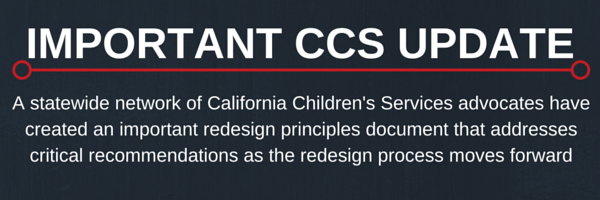This newsletter was sent April 22, 2016. If you’d like to receive our next bi-weekly digest full of a curated collection of resources, workshops, policy highlights, and action items that affect children and youth with special health care needs, please sign up here.
NEWS
Family Voices Of California Annual Health Summit Highlights Report Now Available
This report recaps our 2016 Health Summit And Legislative Day and provides information on speakers and panel content, breakout sessions, legislative meetings, and conference feedback. To read the report, click here.
Statewide Network Of CCS Advocates Issue Document With Recommendations And Principles For The DHCS To Use In Their CCS Redesign Process
The document, “Principles For The Future Of The California Children’s Services Program,” recommends that the CCS redesign should address family partnerships, program standards, provider network, continuity of care, monitoring, and rates. We hope this information will assist individuals as they think about and advocate for improved services for children and youth with special health care needs. To read the document, click here.
Family Voices Of California Supports Two Key Foster Care Mental Health Initiatives
In conjunction with the National Center For Youth Law, Family Voices Of California wrote letters of support for SB 1291 and SB 1174. SB 1291 requires that county mental health plans create a subsection for youth and that they also include an annual foster care mental health plan that details the services available to these children. SB 1174 allows the Medical Board Of California to confidentially collect and analyze data, and, when warranted, look into physicians who frequently prescribe medication that is over the recognized safety parameters for children. To read the Daily Democrat’s related article on increased oversight of psychotropic medication use, click here.
Medi-Cal Expands To Include Undocumented Children
Beginning May 16, Medi-Cal will widen its coverage to incorporate undocumented children under 19. For those families exceeding a certain income bracket, a low-cost premium may be required. If you’d like to take action now, it’s suggested that children be placed in restricted Medi-Cal where they’ll be automatically enrolled in full-scope coverage on May 16. It’s anticipated that roughly 170,000 children will qualify for the program. Click here for a helpful one-pager, and here to read California Health Report’s article on ensuring proper outreach is done to encourage enrollment.
GIVE INPUT
Letter To DHCS: Recommendations For More Child-Focused Medi-Cal Health Indicators In 2017
You have the unique opportunity to help improve the quality of health care for more than half of California’s kids—many with disabilities. By signing the letter of support drawn up by Children Now, you’ll encourage the DHCS to collect data focused on ensuring that kids have the care they need to grow up strong—physically, emotionally, and cognitively. Reported data will also reflect patient satisfaction for families with children with special health care needs. To sign the letter, click here.

Study: Measuring Resiliency In Parents Of Children With Special Needs
Psychologists at East Tennessee State University are conducting a national study with the goal of learning more about the experiences of parents of children with special needs, how they cope with daily life stressors, and what the effects of care-giving have on their physical and emotional health. Rather than focusing on the negative aspects of family life, the researchers are motivated by positive psychological functions such as resiliency, coping strategies, and strength. If you’re a parent of a child with special needs, please consider taking 30 minutes to complete the confidential, anonymous survey by clicking here.
Study: When A Sibling Has Autism: The Effect Of Relationship On Affect
Researchers at the University Of South Dakota are looking at two relationship components, warmth and conflict, and how they’re impacted in relationships where one sibling has autism and the other is typically developing. The researchers hope to further the knowledge about these types of relationships in order to inform therapies or interventions to strengthen them. If you’re a parent of both a child with autism and a typically developing child, please consider taking the short survey (there will be a few questions for your typically developing child to answer as well). For more information on the study and to complete the survey, click here.
Upcoming CCS Advisory Group And Technical Working Group Meetings
May 11: CCS Data And Quality Measures Technical Working Group
June 3: CCS Care Coordination/Medical Home/Provider Access Technical Working Group
June 29: CCS Advisory Group Stakeholder Meeting
For information on these meetings, click here.
WEBINARS
April 26: Tips For Communicating With And Supporting The Non-Verbal Child
Sponsors: The Infant Development Association and the MAP To Inclusion And Belonging Project of WestEd Center For Child And Family Studies
Led by two pediatric speech language pathologists, this webinar is designed to help caregivers, teachers, and home visitors who work with non-verbal children think about communication development. To register, click here.
April 26: Pediatric Disaster Planning And Preparedness
Sponsors: EMSC National Resource Center and ASPR TRACIE
ASPR TRACIE is a healthcare emergency preparedness hub that ensures all stakeholders have access to resources to improve preparedness, response, recovery, and mitigation efforts. In this webinar, two of their project directors will discuss their organization and how its resources can best assist individuals in their pediatric disaster planning efforts. To register, click here.
April 27: Genetics And Autism Spectrum Disorder
Sponsors: AIR-P and the Autism Treatment Network
In this webinar, Abha Gupta, MD, PhD, will provide a brief review of human genetics and the type of mutations researchers look for in association with ASD. She’ll focus on clinical genetic testing and then transition to the future direction and challenges in the field of ASD genetics. To register, click here.
April 28: Make Your Voice Heard: Enrollment Assisters In Public Policy
Sponsor: Families USA
Enrollment assisters have an important role to play in educating public officials and advocating on behalf of consumers. This webinar will teach you how to educate public officials about both your work and the communities you serve. It will detail how to use the Public Policy Toolkit For Enrollment Assisters and feature speakers who have been successful in engaging in advocacy. To register, click here.
April 29: A Conversation With State Officials On Medicaid Dental Managed Care
Sponsor: National Academy For State Health Policy
In this webinar, state policymakers from Arizona, Kentucky, and Pennsylvania—three states that administer Medicaid benefits through managed care contacts that include both medical and dental services—will share their insight on ensuring contractors and subcontractors maintain an adequate network of dental providers, provide outreach and care coordination to members, and promote quality improvement. To register, click here.
May 6: Don’t Forget The Dads! The Important Role Of Fathers In Child And Family Health
Sponsors: American Academy Of Pediatrics, FamilY Partnerships Network, and the Committee On Psychosocial Aspects Of Child And Family Health
Fathers play a very important role in a child’s health. However, they’re sometimes not included in the conversation or institutional biases may be present that discourage their involvement. This webinar will feature three expert fathers who will share research on this topic as well as anecdotal stories from other fathers. To register, click here.
RESOURCES
Graduate School Scholarships For People With Disabilities
Organized by Go Grad, this helpful guide provides a current list of graduate scholarships available for students with disabilities. In addition, it has information on navigating the graduate school landscape, tips for those with hearing and vision impairments, and ideas for additional funding resources. To browse the guide, click here.
Your Legal Toolbox: Special Education Law For Children With Behavioral Disorders
In this three-part radio series sponsored by the Coffee Klatch, parent and special education law expert Bonnie Shinagle discusses how to ensure children receive the right accommodations, proper education, and appropriate school/IEP placement under special education law. To listen to parts one and two, click here (scroll down to learn about part three, which will be released soon).
Access To Care For Children With Special Health Care Needs: The Role Of Medicaid Managed Care Contracts
This MACPAC report looks at how Medicaid managed care contracting terms ensure access to care for children with special health care needs. It presents findings from the analysis of state contracts supplemented with interviews with state Medicaid officials, managed care organization representatives, consumer advocates, and other stakeholders. To read the key findings or download the entire report, click here.
Helping Families Of Children With Special Needs Understand Deductibles
The latest blog post from the National Center For Family Professional Partnerships lays out one of the most confusing aspects for families of children with disabilities: deductibles. Many patients will choose plans with cheaper deductibles, and this often means fewer benefits. This could be especially troubling to families who have children with complicated health care needs. To read the blog post, click here.
SPECIAL EVENT
Understanding The Puzzle: 9th Annual Autism Spectrum Disorders Conference
Sponsored by Stanford Autism Center at Lucile Packard Children’s Hospital Stanford, this conference gives community members a chance to learn about new autism research and therapies. Keynote speakers include Catherine Lord, PhD, Peter Mundy, PhD, and various Stanford researchers. Parents, teachers, pediatricians, psychologists, caregivers, media, and anyone interested in autism are interested are invited to attend. For more information and registration instructions, click here.
ARTICLES
“CDC Confirms Zika Can Cause Brain Defects In Babies”
“Rural Kids Face Special Challenges When Seriously Ill”
“How To Get Your Kid To Do What You Say, Without Punishing”
“Netflix Agrees To Offer Audio Description Tracks On More Titles”
“California Formally Moves To Merge General And Special Education”
“Autism Wandering Bill Gains Momentum”
“New Polio Vaccine Rolled Out In Massive Worldwide Switch”
“Running To Beat Schizophrenia”
“Birth Spacing May Influence Autism Risk”
“Low Special Education Graduate Rates Haunt Educators”
“A Dearth Of Hospital Beds For Patients In Psychiatric Crisis”
“People Who Avoided Illness Could Be Key In Treating Those Who Didn’t”
“Parents Find Ways To Mitigate Bullying, Teasing”
“I Shouldn’t Have To Fight To Get My Son With Special Needs Into A Public School Classroom”








